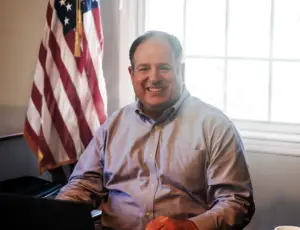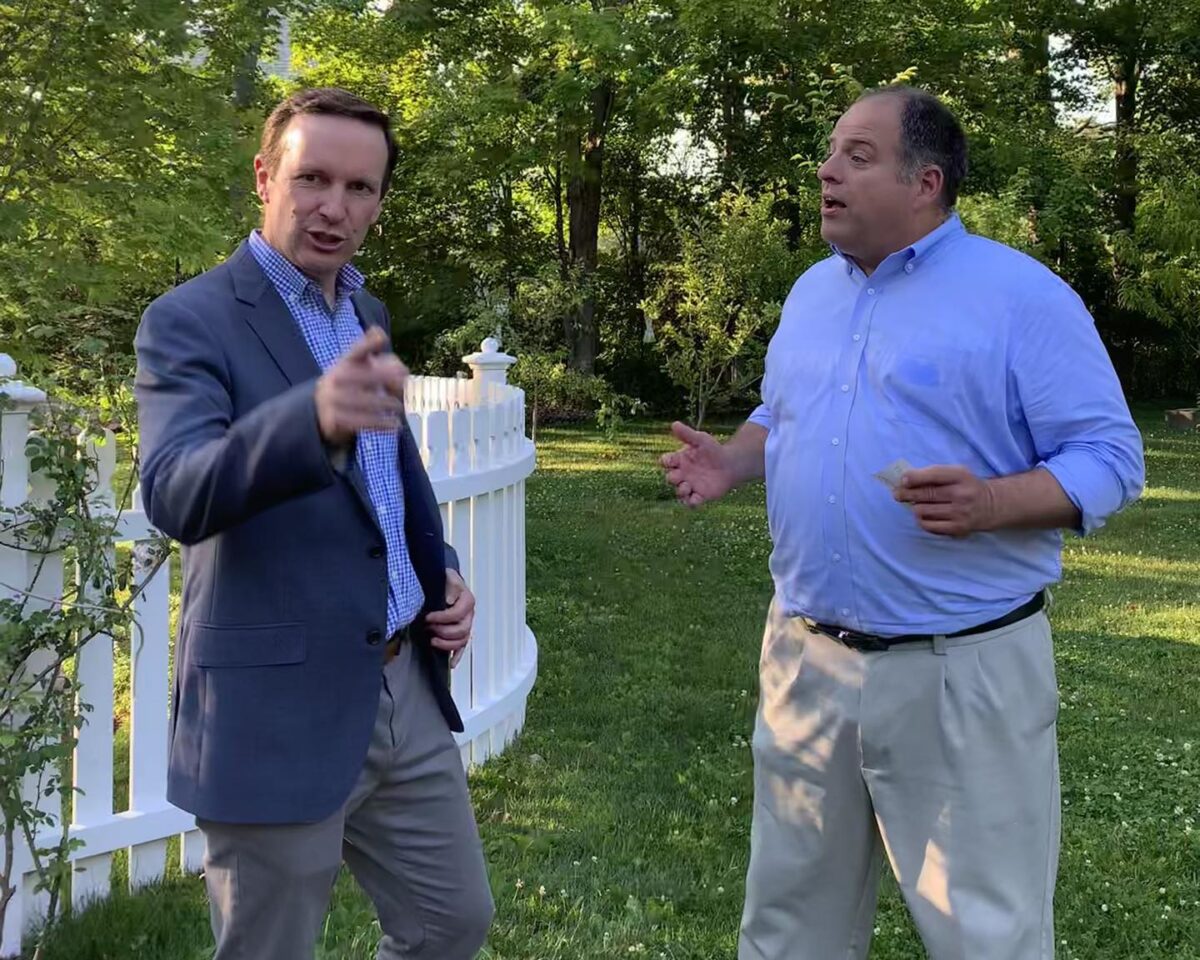In the Spotlight: Fairfield First Selectman Bill Gerber

Fairfield’s newly elected First Selectman William A. “Bill” Gerber has had to hit the ground running, with a number of in-progress projects and high-priority infrastructure decisions occupying the first weeks of his term.
A Democrat who defeated Republican incumbent Brenda Kupchick in last November’s election, Gerber is drawing on his years of experience in both the Fairfield Representative Town Meeting and the corporate world as a chief financial officer in the insurance industry for 16 years to help tackle the challenges. He also credits a strong support team hard at work in the town’s Independence Hall with helping him meet the expectations of the electorate.
“I jumped right into budget season,” Gerber said. “We’re already going through budgets for next year, and we’ve already got some really big issues like United Illuminating trying to put monopoles throughout town.”
Gerber acknowledged the opposition to the United Illuminating project but insisted, “We believe it’s very justified. I think there’s a misconception by some people that this is just another ‘not in my backyard’ thing, but this is much more than that. These monopoles are going to really hurt, all across the town. They’re huge, and they’re going to be quite invasive on commercial, private, and residential property. There’s going to be valuation issues and economic impact on town, also going into historic districts in Bridgeport.”
Gerber also noted he is focused on addressing how the state’s ongoing housing crisis impacts the town.
“In Fairfield we tried to do a lot, but it’s been sort of a drop in the bucket. If you look at the statistics 10 years ago, we were at 2.7% affordable housing,” Gerber said, noting that the state defines affordable housing as 80% of the median average cost of housing within the region. “I believe we’re at 2.8% now. We have a minimum [affordable housing level] set aside of 10%. So, every time you build a hundred apartments, you put in 10 affordable ones. But you won’t move the needle enough to bring it up, and that’s where that 0.1% comes from. It’s just a teeny bit from the set asides.”
“The issue in Fairfield is always the cost of the land,” Gerber added. “If you’re out there buying land and you’re not getting it at a discount from somebody who wants to leave that as their legacy or possibly from the state it’s really hard to make the economics work. Usually, the way the economics work is with more density than the neighbors would want. If you’re putting 80 units on a lot that typically you would only expect to see four houses.”
Gerber stated that higher density often prompts local opposition, and he expressed hope about using the town’s planning and zoning apparatuses to encourage growth at a rate that can help meet the need for affordable housing without upsetting the town.
Musing about the possibility of using some town owned parcels for affordable housing construction, Gerber explained that he believes the town is not split along YIMBY/NIMBY lines.
“There is a large group of people that understand the need for affordable housing,” he continued. “And there is another large group of people that say that we have terrible traffic and we’ve got infrastructure issues, and you have to solve them first.”
Gerber pointed to several locations across Fairfield where pipes will need replacing regardless of changes to the city’s population. He also expressed hope about improving Fairfield’s traffic through street redesigns that will not only improve the flow of car traffic and enable the construction of needed new housing, but also encourage pedestrians to visit downtown locations as well as bolster the town’s brick and mortar retailers.
“I actually wrote an ordinance when I was on the RTM called the Safe and Livable Streets Ordinance, and it requires a Complete Streets Coordinator,” Gerber said, happily pointing out that he’s now responsible for carrying out his own legislation. “That function is going to be someone who focusses not only on fielding complaints but also proactively going out and looking at every street for safety improvements for bikes and pedestrians. We’re going to be allocating more of our budget and while we do that, we will be eligible for more grants to put in complete streets architecture.”

Gerber said he is considering many options to handle these issues, which he sees as major issues to solve for the town’s future. He floated the possibility of a downtown shuttle service linking the train stations with other sections of the town’s commercial core, saying there was historical precedence for such a service. He also identified Fairfield’s beaches as an outstanding issue to address during his tenure.
“A couple weeks ago we got a flood study done by RACE Coastal Engineering for a 10-year flood,” Gerber said, explaining that a recent FEMA study based on 100-year floods was deemed insufficient by some of the town’s coastal residents. The study revealed issues with Penfield Pavilion’s current state. Complying with the FEMA guidelines may leave the site less able to withstand more frequent floods, particularly with regards to sea level rise.
“We’re going forward with construction at the end of January,” Gerber said, after having elected to comply with the FEMA notice of violation, although he said there may be future work necessary at the location.
Unruly parties made up of local college students are also on Gerber’s radar. He said he even went to see one party that had overwhelmed Fairfield’s police department and led to hospitalizations.
“I actually stopped and talked to a bunch individually, they were all super cool for the most part,” Gerber said. “I know these are by and large good people, it’s just the nature of events like that that brings out the worst in people.”
Gerber hoped to coordinate an understanding between the town and both Fairfield University and Sacred Heart University that would not just rein in events that lead to trashed beaches, but to “bring down the walls” that lead to a degree of separation between the universities and the community.
“There are great things that have happened,” Gerber said, pointing to the Quick Center and the Community Theater. “But there’s a lot more that can happen. It doesn’t feel like a college town to me.”
Efforts to incorporate the universities into the community better as well as connect the sections of town divided by roads and lack of pedestrian access dovetailed with what Gerber said was a top priority.
“Inclusion – a big priority I have is making sure that everybody feels welcome here and that everyone feels that they’re being treated equally. We have growing populations of minorities, and not just racial and religious minorities,” said Gerber. “It’s essential and, of course, in my heart I feel this way. But I also think from a cold, calculating perspective if you want to be competitive you need to attract the best people. And the best people don’t all come in one color or religion. So, I would like people to feel that they can move here. There are historic reasons, you might even say system reasons for it being the way it is, but we have to break that cycle.”